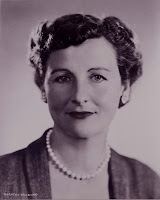I am a great fan of, the oft mentioned here, E. F. Benson and P. G. Wodehouse both of whose creatures inhabit, as do Mitford's, an England caught between the two Great Wars. A period of flux and change, of discovery and of loss for a generation and a world that never quite recovered from the effects of those 5 years. That period of the "lost generation" does not appear to ruffle Benson's upper middle-class citizens of Tilling - what other than the intrigues of their own little world does? - nor disturb the antics of members of Bertie's Drones Club. But in Highland Fling Mitford recognizes the incredible gap between a generation who had fought for a set of values which they were then told were out-dated and valueless by a generation that had no regard for them or their values. If I weren't reading an novel written in the 1930s I would swear Mitford was talking about today.
But at the same time, Gates, there is something I should like to say to you, which is, that I think you have no right to speak as you did of the men who fought in the War. Sneering at them and hoping they enjoyed it, and so on. I know you did not really mean to say much, but remember that sort of thing does no good and only creates more bitterness between our two generations, as though enough does not exist already. I know that many of us seem to you narrow-minded, stupid and unproductive. But if you would look a bit below the surface you might realize that there is a reason for this. Some of us spent four of what should have been our four best years in the trenches.
'At the risk of boring you I will put my own case before you.
'When the war broke out I was twenty-eight. I had adopted literature as my profession and at the time was an art critic on several newspapers. I had also written and published two books involving a great deal of hard work and serious research - the first, a life of Don John of Austria, the second, an exhaustive treatise on the life and work of Cervantes. Both were well received and encouraged by this, I was, in 1914, engaged upon an extensive history of Spain at the time of Philip II, dealing in some detail, with, for instance the art of Velásquez and El Greco, the events which led to the Battle of Lepanto, the religious struggle in the Netherlands and so on. I had been working hard for three years and had collected most of my material.
'On the fifth of August, 1914, whether rightly or wrongly, but true to the tradition in which I had been brought up, I enlisted in the army. Later in that year I received a commission. I will not enlarge upon the ensuing years, but I can't say I found them very enjoyable.
'When in 1919, I was demobilized, I found that, as far as my work was concerned, my life was over - at the age of thirty-three. I was well off financially. I had leisure at my disposal. I had my copious notes. Perhaps - no doubt, in fact - it was a question of nerves. Whatever the reason, I can assure you that I was totally incapable of such concentrated hard work as that book would have required. I had lost interest in my subject and faith in myself. The result is that I am now an oldish man, of certain culture, I hope, but unproductive, an amateur and a dilettante. I know it. I despise myself for it, but I cannot help it.
'And that, I am convinced, is more or less the story of hundreds of my contemporaries.
'Everyone knows - you are at no pains to conceal it - that the young people of today despise and dislike the men and women of my age. I suppose that never since the world began have two generations been so much a variance. You think us to be superficial, narrow-minded, tasteless and sterile, and you are right. But who knows what we might have become if things had been different?
'That is why I do earnestly beg of you not to speak sarcastically, as you did just now, of the men who fought in the War. Leave us, at any rate, the illusion that we were right so to do.
Highland FlingNancy Mitford - 1931Penguin - Fig Tree - 2011Available at Amazon
Mitford knew her people and her time well. And for a young writer she captured the feeling of that "lost generation" without great drama - simply almost tenderly.
12 February - 1429: English forces under Sir John Fastolf defend a supply convoy carrying rations to the army besieging Orleans.



1 comment:
What a world of loss and pain was inadequately summed up by that old word, "nerves." Yes, clearly Mitford was a writer of great perception and depth. I haven't read any of her books. Perhaps I should.
Post a Comment